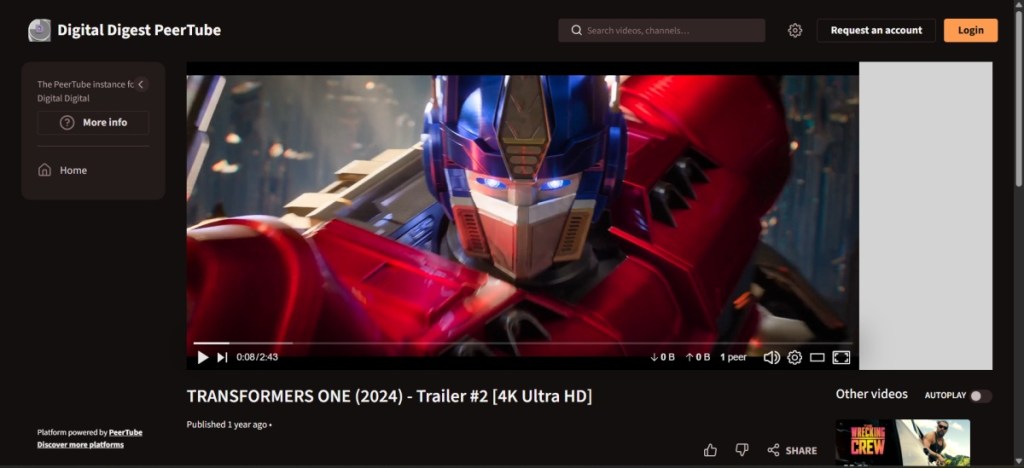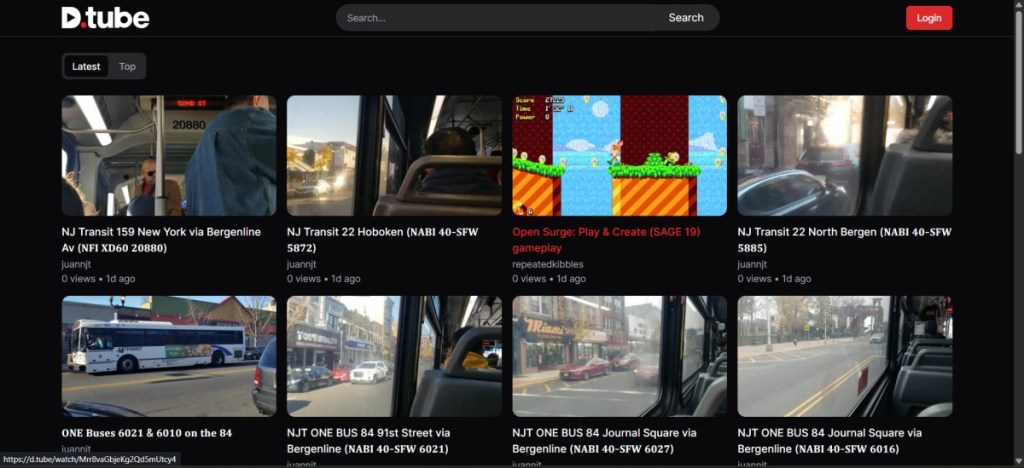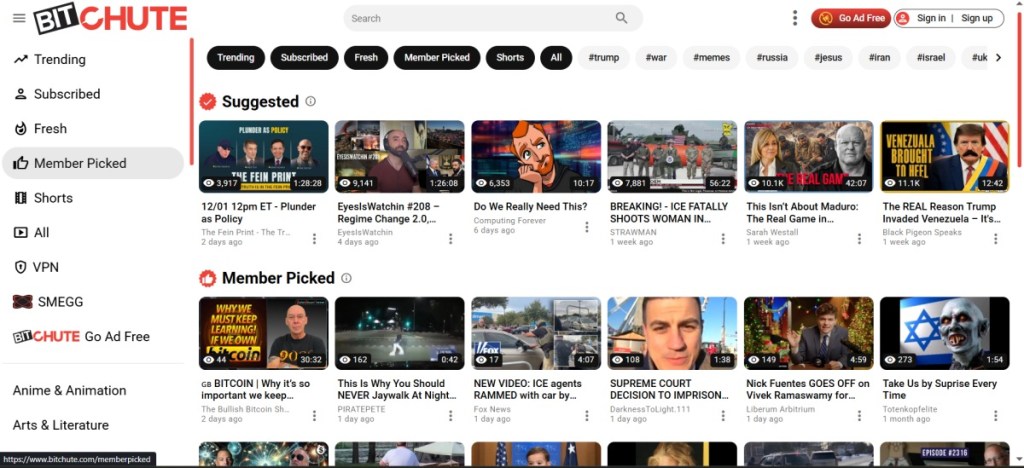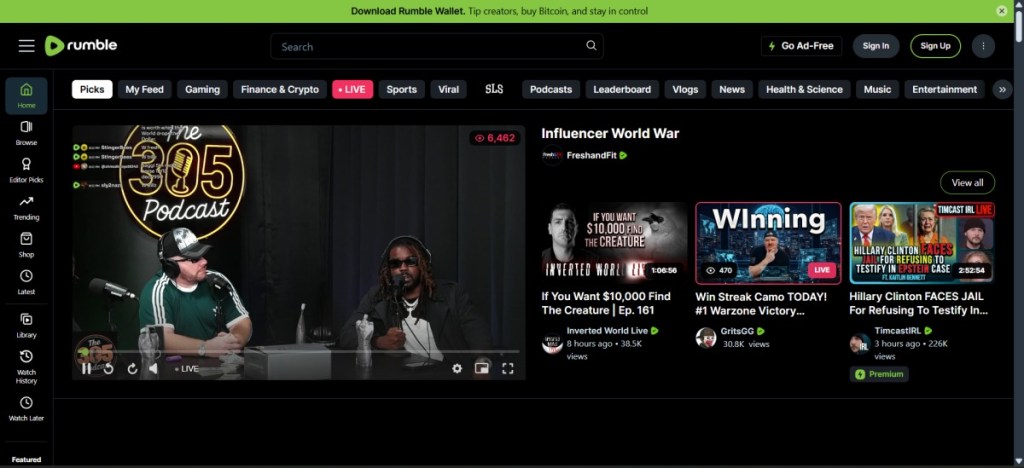YouTube is the biggest video streaming service in the world and houses all sorts of content that you love to watch under one roof. However, not everyone is happy with it. From unskippable ads, growing prices of its Premium subscription, and monetization problems for its creators, there is a lot wrong with it. So, if all this has you looking for another platform to watch and publish videos, then here’s a list of the best YouTube alternatives in 2026.
Overview of the Best YouTube Alternatives in 2026
We have tried and surveyed many users for their recommendations for the best YouTube alternatives, and here are the top picks that we have found.
| YouTube Alternatives | Best Suited for | Limitations | Pricing |
|---|---|---|---|
| Vimeo | People who want a more popular YouTube alternative with a wider audience and content library without ads | Most advanced features require paid plans and public content discovery is limited | Free, $25/month for creators |
| Dailymotion | Those looking for a more mainstream YouTube alternative with news, sports clips, and short-to-mid-length videos | Smaller creator ecosystem and weaker recommendations | Free |
| Twitch | Users who want to watch livestreams, and creators who want to make a living out of the platform | It is not a traditional video-based YouTube alternative | Free, can buy subs for particular streamers |
| Nebula | People looking for thought-provoking, high-quality video essays and discussions | Requires up front subscription to continue using the service | Free, paid plan starts at $6/month |
| Odysee | Creators and viewers looking for a decentralized YouTube alternative with a clean UI, growing library, and crypto-based rewards | Smaller audience and weaker discovery | Free |
| PeerTube | Creators and viewers who want complete independence from Big tech and advertisers | Limited content library, discoverability and no native monetization options | Free |
| DTube | Creators and viewers seeking censorship free video streaming service with built-in rewards for creating content | Crypto earnings are volatile and constantly fluctuate in value | Free |
| BitChute | People looking for a familar YouTube experience without much censorship | Connection could be laggy due to P2P network, features ads | Free, Membership to remove ads available at $83/year or $199 for a lifetime |
| TED | People who want high-quality, expert-led talks on variety of subjects and streams | Not the traditional type of YouTube alternative platform | Free, Donation based memebership |
| Rumble | More mainstream style YouTube alternative with transparent monetization options | Recommendations and search are not optimized to find niche content | Free, Rumble Premium starts at $1.10/month |
Best YouTube Alternatives for Video Streaming Compared
This list contains a list of some of the best YouTube alternatives you can check out. However, some of them may have content dissimilarities and preferences. We have compiled 10 alternatives, so you should be able to find a platform that hosts the type of content you enjoy by the end of this list.
1. Vimeo
After YouTube, Vimeo is probably the most famous video-sharing website out there. Vimeo was launched back in 2004 and has slowly but strongly become a major player in the video streaming services. The company has more than 90 million monthly active users with over 35 million registered creators.

While these numbers might seem low when compared to YouTube, the basic concept of quality vs quantity applies here. Vimeo is a mature video-sharing platform that attracts artistic creators in films, animation, music, and more. As a result, the community isn’t as big as YouTube. It’s much more appreciative of the content that is being published, with far more constructive comments.
The platform has paid plans, allowing creators to pay to gain extra features, which makes them a little bit more serious about the type of content being produced. Besides, Vimeo is available on almost all the platforms out there, just like YouTube. Overall, if you don’t appreciate the noise generated on YouTube and want to enjoy hand-picked content inside a positive community, you should check out Vimeo.
| Pros | Cons |
|---|---|
| Flourishing and constructive community | No ad-based revenue sharing |
| Over 90 million monthly active users | Not totally free for creators |
| Quality of content is better | |
| Revenue through donations |
Price: Free, $25/month for creators
2. Dailymotion
Just like YouTube, Dailymotion is a video-sharing platform where you can create an account and publish your videos. Similarly, viewers can visit the website and watch the published content for free. Dailymotion differs from YouTube by bringing far more relaxed policies for creators and viewers.

That is both a good and a bad thing. The good thing is that you don’t need an account to watch videos (no age restriction) on Dailymotion. However, the relaxed policies of Dailymotion also mean that it is very easy for someone to republish your videos, and there’s not much you will be able to do about it.
| Pros | Cons |
|---|---|
| No age restriction | Analytics does not match up to YouTube |
| Not required to create an account | |
| Ad-based revenue sharing like YouTube | |
| Nice interface |
Price: Free
3. Twitch
Twitch is a platform that is made entirely for gamers. If you are someone who wants to earn money by using your gaming talents or just want to enjoy someone’s gameplay, Twitch is the place to do it. Since its launch, the service has evolved and now includes dedicated streams focusing on artwork, music, talk shows, and more. It is mostly dominated by the gaming community. Unlike YouTube, where you can find content on any and all topics, Twitch still remains fairly niche, and that is its biggest strength.

One thing that differentiates Twitch from any other video website is that it hosts a ton of live streaming content, something that is not normal for other video platforms. In fact, live streams of gaming sessions are the crucial ingredient that has made Twitch such a successful company.
Twitch also has a very different monetization method. Instead of using ads to monetize content for its creators, Twitch allows creators to accept donations from viewers. This not only ensures that the platform is totally free of ads, but it also means that viewers who donate to their favorite creators feel like a part of a tight-knit family.
Hence, the community at Twitch is more friendly and genuinely cares about its creators. If you are into games and want to see some breathtaking gameplay while supporting the creators who play the games, there is no better place to do that than Twitch. If you like live streaming platforms but don’t like Twitch in particular, you can check out our favorite Twitch alternatives.
| Pros | Cons |
|---|---|
| Tight-knit community | Not great for non-gaming content |
| Heaven for gamers | |
| Revenue through donations | |
| Great alternative to YouTube Gaming |
Price: Free
4. Nebula
Next, we come to Nebula, where you can find videos, podcasts, and classes from thoughtful creators. You can think of Nebula as the curated version of YouTube. For creators, Nebula is one of the best YouTube alternatives out there. Videos are owned by creators, and they earn revenue through user subscriptions.

Apart from that, users can find exclusive content here that may not be available on YouTube. Many YouTube creators publish their content on Nebula exclusively. Besides watching videos, you can also join classes and learn about new topics.
| Pros | Cons |
|---|---|
| Thoughtful videos and podcasts from creators | Video library is small |
| Learn about new topics | |
| Attend classes |
Price: Free, paid plan starts at $6/month
5. Odysee
Odysee is a new video-sharing platform where creators can upload their videos and viewers can watch videos for free. It has been developed by LBRY, which is a blockchain-based decentralized platform. Launched in 2020, Odysee has a lot of monthly active users. While it doesn’t contain videos from mainstream content creators, there are a lot of other creators you can watch to keep yourself entertained.

Odysee is popular for providing an open-source alternative to YouTube. It’s against anti-censorship, so videos are not highly censored. However, content moderation is still applied based on community guidelines. It hosts millions of videos ranging from pop culture, lifestyle, tech, comedy, and more.
| Pros | Cons |
|---|---|
| Open-source alternative to YouTube | Small community |
| Over 7 million monthly active users | Cryptocurrency price changes effect earnings |
| Hosts millions of videos |
Price: Free
6. PeerTube
PeerTube is a completely open YouTube alternative, in the sense that it is a decentralized platform, where each user runs their own instance and connects it with a network of other users. This allows every user to truly own the content that they create without any platform limitations or restrictions. It uses peer-to-peer tech, hence the name PeerTube, to reduce server strain and promote creator independence without any control from a massive tech company or advertisers.

| Pros | Cons |
|---|---|
| Truly decentralized video hosting | Very limited discoverability vs YouTube |
| Ad-free, privacy-first experience | Smaller user base and content library |
| Clean UI that is easy to browse | No built-in monetization options |
| Promotes complete creator independence |
Price: Free
7. DTube
DTube is a decentralized, blockchain-powered video platform that shares several similarities with PeerTube. But what makes it a strong contender in the best YouTube alternative list for 2026? Well, it is built upon IPFS (InterPlanetary File System) and blockchain tech, which lets users upload and share videos without relying on a single corporate server. So there is no downtime ever, and even if one server goes down, there are multiple others to keep the platform running.

Moreover, the decentralized nature means that DTube is ad-free by default and rewards creators with cryptocurrency. This makes it appealing for creators who want complete ownership of their platforms while earning direct rewards for their videos. However, one thing to note about earning in cryptocurrency is that its market value fluctuates constantly.
| Pros | Cons |
|---|---|
| No ads or corporate oversight | Crypto earnings fluctuate in value |
| Crypto-based rewards for creators | Occasional playback lag due to decentralization |
| Attractive, polished, and easy to browse UI | |
| Decent library of content |
8. BitChute
BitChute is a free YouTube alternative that prioritizes minimal moderation and creator freedom over algorithms. Its interface will feel familiar and straightforward, making it easy to use for new users. There is a variety of content here, and the video playback is generally stable as well, though it does not feel as polished as YouTube itself. There is occasional buffering, but since it is a peer-to-peer YouTube alternative, like PeerTube, these things are to be expected.

However, as a viewer, the best part about BitChute is that there are no aggressive recommendations, which makes the platform feel less manipulative. The platform easily serves as the best YouTube alternative, if you are not chasing features or a massive reach of subscribers.
| Pros | Cons |
|---|---|
| Minimal censorship and fewer content restrictions | Inconsistent video playback quality |
| Simple, familiar interface | Features ads and requires membership to remove them |
| Free to use without mandatory ads | Weak discovery and recommendation system |
| Supports long-form and niche content |
Price: Free, Membership to remove ads available at $83/year or $199 for a lifetime
9. TED
While we know TED as a media organization that holds conferences on many seminal topics, it also maintains a video platform that hosts all its talks and conferences from all around the world. You can find videos on several topics, including technology, science, nature, education, global warming, social change, and more. If you want to avoid YouTube because you’ve been wasting too much time on the platform, TED is definitely the platform for you

The best part about TED is that you get to hear experts from various fields, which adds to your understanding of the world. As of now, it has more than 4,700 videos and talks, which are quite inspiring and riveting. I would say, if you want to spend time learning something new in an enjoyable way, then TED fits the bill quite well. Also, if you are short on time and want to understand social phenomena around the globe, TED videos make for a compelling watch.
| Pros | Cons |
|---|---|
| Hosts more than 4700 videos | The content catalog is nowhere near as vast as YouTube |
| A vast library of inspiring videos on technology, social change, health, etc | |
| Talks from experts hence reliable information | |
| User interface and video playback is right up there with YouTube |
Price: Free, Donation based memebership
10. Rumble
Rumble is another small but growing YouTube alternative that is seeing steady growth in 2026, due to mainstream content and creator-friendly policies. Its interface looks similar to more traditional video platforms, with category-wise navigation, trending sections, subscriptions, and more. The content library is also quite broad, and you will find all sorts of stuff, whether it is vlogs, news, or commentary videos.

The video playback is also pretty smooth and reliable, and works great across desktop or smartphones. The best part is that it supports monetization for creators that is more transparent in nature and simpler to understand. This explains why many young creators are flocking to this service. And of course, there is a lot of freedom for the kind of content you post, without worrying about your video being taken down.
| Pros | Cons |
|---|---|
| Easier monetization and creator revenue sharing | Less polished creator tools |
| Familiar, user-friendly interface | Limited content availability in some regions |
| Broad content variety | Smaller audience and content ecosystem |
| Smooth video playback on web and mobile |
Price: Free, Rumble Premium starts at $1.10/month
That ends our list of the best YouTube alternatives that you can check out to stream videos. As far as I am concerned, Vimeo, Nebula, BitChute, and Twitch are the two best alternatives to YouTube for me. Given that most of these platforms don’t have as large a user base as YouTube, you might have trouble making a living out of making videos on them, except for Twitch. That said, which one did you try out and found to be your perfect YouTube alternative? Let us know in the comments below.



![[UPDATE: Fixed] Songs from Popular Artists Are Actually Missing on YouTube](https://static.beebom.com/wp-content/uploads/2024/09/Its-Not-You-Its-YouTube-Songs-from-Popular-Artists-Are-Actually-Missing.jpg?w=300&quality=75)






